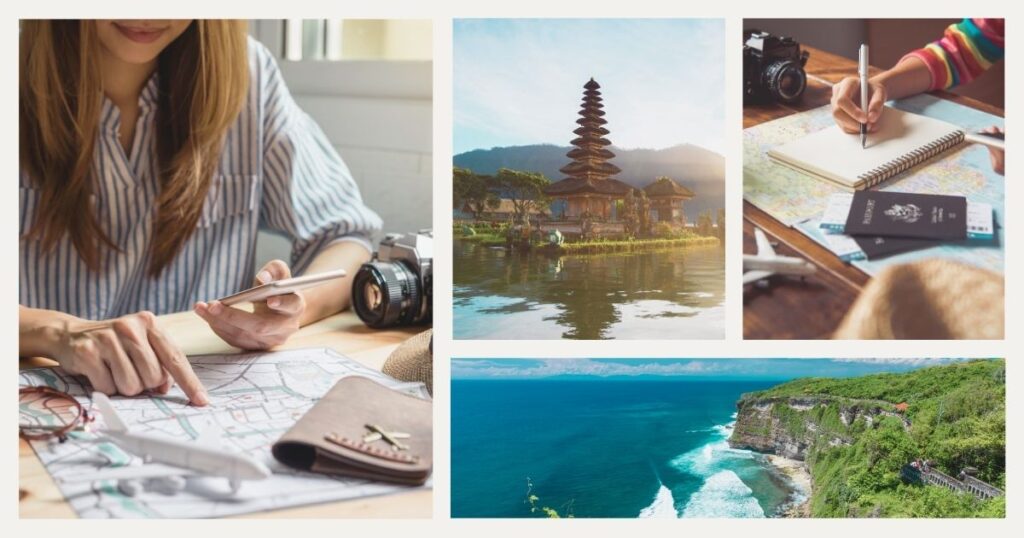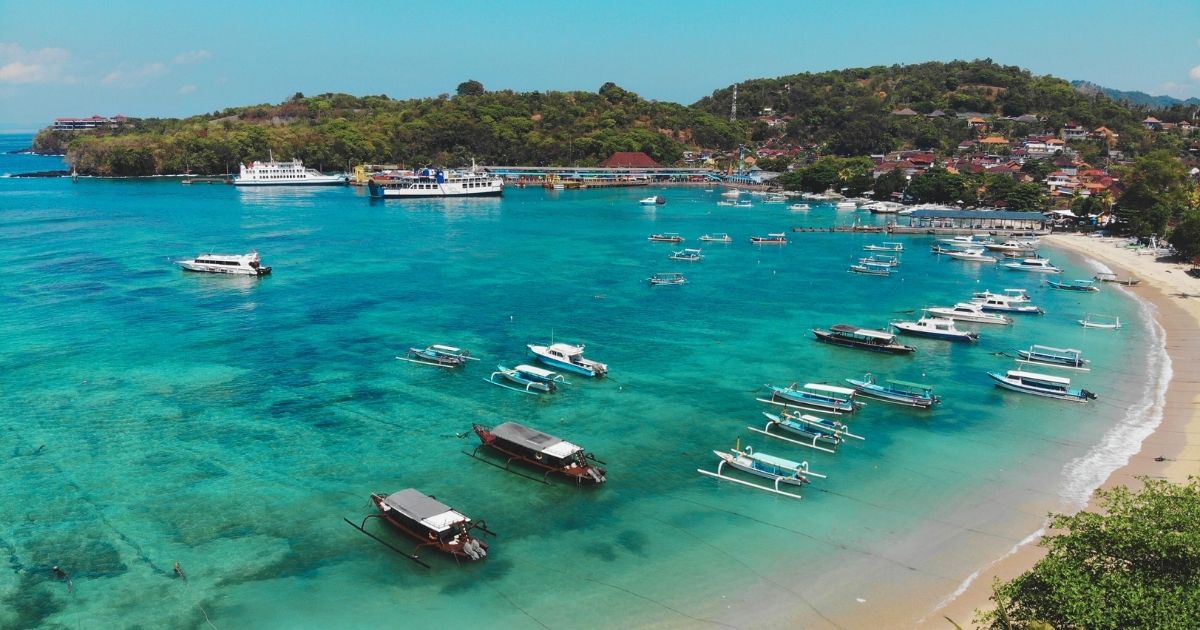Stepping off the plane into Bali’s tropical embrace, you’re greeted by the intoxicating blend of incense from temples, warm humidity, and vibrant energy that makes this Indonesian paradise a digital nomad magnet. This comprehensive Bali travel guide reveals everything you need to transform your island adventure into a life-changing experience.
Bali represents more than pristine beaches and Instagram sunsets—it’s the unofficial capital of the digital nomad movement, offering world-class infrastructure, affordable living costs, and cultural richness that inspires creativity. From Ubud’s rice terraces to Canggu’s surf breaks, every corner offers opportunities for remote workers.
This essential Bali travel guide covers visa requirements, accommodation options, transportation tips, and cultural insights for a smooth Indonesian journey.
Essential pre-travel planning

Successful Bali adventures begin with strategic planning, addressing visa requirements, health preparations, and financial considerations. That’s what our Bali travel guide is for!
Visa requirements and options
Indonesia offers multiple visa options for different travelers. Tourist visas provide 30-day stays with single extensions possible, while business visas offer longer durations.
The digital nomad visa program, known as the Second Home Visa, targets remote workers planning extended stays. This program requires significant financial proof but provides multi-year access.
Visa-on-arrival options remain available for many nationalities, though advance preparation often provides better terms. Research requirements for your nationality, as policies change frequently.
💡 Did you know? Indonesia’s visa policies favor visitors who can demonstrate stable income and long-term travel intentions. Digital nomads with documented remote work arrangements often receive preferential treatment during application processes.
Health and safety preparations
Tropical travel requires specific health preparations, and a few words of warning belong in any good Bali travel guide. Vaccination recommendations include hepatitis A and B, typhoid, and Japanese encephalitis.
Travel insurance becomes crucial for nomads planning extended stays, covering medical emergencies and equipment protection. Comprehensive policies should include extreme sports coverage if you plan activities.
Water safety remains a concern, with bottled water recommended for drinking. Stomach adjustments typically occur during the first week.
Best destinations and regions
Bali’s regions cater to different nomad lifestyles, offering varying infrastructure, community, and natural beauty.
Canggu: the digital nomad capital
Canggu has emerged as Bali’s digital nomad headquarters, offering surf culture, coworking spaces, and an international community. The area features high-speed internet cafes and accommodation options designed for nomads.
The beachside location provides access to surf breaks, while inland areas offer quieter neighborhoods for work. Canggu’s restaurant scene caters to international tastes with healthy options.
Transportation relies on motorbikes and bicycles, with most amenities within reach. The area’s popularity means higher prices, but infrastructure benefits often justify costs.
🌟 Pro tip: secure reliable internet connectivity throughout your Bali adventure with Holafly’s seamless coverage to ensure consistent communication with clients and access to work platforms regardless of your location on the island.
Ubud: cultural heart and creative hub
Ubud offers a different energy from coastal areas, focusing on cultural immersion and creative inspiration that appeals to artists and entrepreneurs.
The town center features coworking spaces, organic restaurants, and wellness centers. Ubud’s proximity to rice terraces and temples provides cultural exploration opportunities.
Accommodation ranges from budget hostels to luxury resorts, many featuring traditional architecture. The cooler mountain climate provides relief from coastal humidity.
Seminyak: upscale beach living
Another popular Bali travel spot, Seminyak attracts nomads seeking sophisticated amenities and premium beach access. The area features high-end coworking spaces, international restaurants, and luxury accommodations.
Beach clubs provide networking opportunities with international professionals, while excellent infrastructure ensures reliable internet. Seminyak’s central location offers easy airport access.
Higher costs reflect premium positioning, but quality of life often justifies the investment for nomads prioritizing comfort.
Accommodation guide for digital nomads

Finding the right accommodation significantly impacts your Bali experience, with options from budget hostels to luxury villas. Here are a few recommendations from our Bali travel guide:
Coworking and coliving spaces
Purpose-built nomad accommodations combine living spaces with work environments, creating communities of remote workers. These facilities include high-speed internet, meeting rooms, and social areas.
Popular coliving brands have established locations throughout Bali, offering standardized amenities and simplified booking. Many properties include services like cleaning and meal plans.
Nomad-specific booking platforms often provide better terms than traditional hotel sites. Research reviews to ensure properties match your work style.
Traditional accommodation options
Hotels, guesthouses, and homestays provide traditional accommodation experiences that immerse nomads in local culture. Many family-run properties offer personalized service and cultural insights.
Airbnb features extensive villa options perfect for longer stays, often providing better value than hotels. Private accommodations offer workspace flexibility and kitchen access.
Location becomes crucial when choosing accommodations, as proximity to coworking spaces significantly impacts daily convenience.
Transportation and getting around: a Bali travel guide
Navigating Bali requires understanding transportation options, from airport transfers to daily mobility.
Airport transfers and arrival
Ngurah Rai International Airport connects Bali to global destinations, with multiple ground transportation options. Official airport taxis provide fixed-rate services, while ride-sharing apps offer competitive pricing.
Pre-arranged transfers through accommodations often provide seamless arrival experiences. Many nomad-focused properties include airport pickup services.
Public transportation remains limited, making private transfers most practical for travelers with luggage.
Daily transportation options
Motorbike rental dominates local transportation, offering flexibility for navigating Bali’s terrain. International driving permits are technically required, though enforcement varies.
Ride-sharing applications provide convenient alternatives for nomads uncomfortable with motorbike driving. Apps like Gojek and Grab offer motorbike and car options.
Bicycle rental suits short-distance travel, particularly in flatter areas. Many accommodations provide bicycle access.
Digital nomad-specific considerations

Remote work success in Bali requires understanding infrastructure limitations and practical considerations that affect productivity.
Internet connectivity and coworking
Internet reliability varies across Bali, with urban areas offering faster speeds than rural regions. Fiber internet has expanded rapidly, though backup connectivity remains essential for important work.
Coworking spaces have proliferated throughout nomad areas, offering professional environments with reliable internet and networking opportunities. Many provide day passes, weekly rates, and monthly memberships.
Power stability issues can disrupt work sessions, making battery backup systems valuable for nomads with expensive equipment. Many coworking spaces provide backup power during outages.
Banking and financial services
Indonesian banking regulations limit foreign account access, making international banking solutions crucial for nomads. Digital banking platforms and multi-currency cards provide convenient alternatives.
ATM availability is widespread in tourist areas, though fees accumulate quickly for frequent withdrawals. Many nomads optimize costs by withdrawing larger amounts less frequently.
Currency exchange services offer varying rates, with bank exchanges typically providing better rates than airport services. Research current rates and plan large transactions accordingly.
Cost of living and budgeting
Understanding Bali’s cost structure helps nomads plan realistic budgets that balance lifestyle preferences with financial sustainability. As your Bali travel guide, we suggest you consider:
Accommodation costs
Budget accommodations start around $10-20 nightly for basic rooms, while mid-range options cost $30-60 for comfortable amenities. Luxury accommodations can exceed $100 nightly.
Monthly rentals provide significant savings, with budget options starting around $300-500 monthly and premium options reaching $1000+. Negotiation becomes possible for extended stays.
Location dramatically impacts pricing, with popular nomad areas commanding premium rates while remote locations offer savings. Balance cost against convenience needs.
Daily living expenses
Food costs vary enormously, from $2-5 for local warungs to $15-25 for international restaurants. Many nomads balance local and international cuisine to maintain budget consciousness and familiar comfort.
Transportation costs remain low, with motorbike rentals costing $50-80 monthly and minimal fuel expenses. Ride-sharing costs accumulate quickly but provide convenience.
Entertainment spans a wide range, from free temple visits to premium spa treatments. Budget allocation for experiences significantly impacts overall satisfaction.
Cultural insights and local customs
Successful cultural integration enhances both personal experiences and professional relationships, requiring an understanding of Balinese traditions and social norms.
Bali’s Hindu culture permeates daily life through temple ceremonies, traditional dress codes, and social hierarchies that visitors should respect. Modest clothing becomes essential when visiting temples.
Gift-giving customs and greeting protocols facilitate positive interactions with local communities, while understanding family structures helps navigate relationships more effectively.
Environmental consciousness has become important to local communities concerned about tourism’s impact. Participating in beach cleanups and supporting sustainable businesses demonstrates respect.
Indonesian business culture emphasizes relationship-building and face-to-face interactions that differ from Western digital approaches. Investing time in personal connections often yields better professional outcomes.
Networking events occur regularly in nomad areas, providing opportunities to connect with international professionals and local business leaders. Language barriers exist, but diminish in tourist-oriented businesses.
But a good Bali travel guide isn’t always enough. Patience becomes essential when navigating bureaucratic processes, as Indonesian time concepts often move more slowly than Western expectations.
Food and dining guide

Bali’s culinary landscape offers incredible diversity, from traditional Indonesian cuisine to international options catering to nomad dietary preferences.
Traditional Balinese cuisine features rice as the foundation, accompanied by proteins and spice combinations creating complex flavors. Popular dishes include nasi goreng, gado-gado, and rendang, providing affordable, filling meals.
Warung dining provides authentic experiences at budget prices, though hygiene standards vary. Observing local patterns and choosing busy warungs with high turnover often ensures fresher food.
Dietary restrictions require careful navigation, as preparation methods may not accommodate Western needs without specific communication. Learning key Indonesian phrases facilitates better restaurant experiences.
Health-conscious dining has exploded throughout nomad areas, with organic restaurants, vegan options, and superfood cafes catering to wellness-focused workers. These establishments often provide nutritional information.
International cuisine availability varies by location, with Canggu and Seminyak offering extensive options while traditional areas focus on local cuisine. Familiar comfort foods provide options when needed.
Grocery shopping requires understanding local ingredient availability. International supermarkets stock familiar brands at premium prices, while local markets offer fresh produce at budget rates.
Final thoughts
This comprehensive Bali travel guide provides the foundation for an incredible Indonesian adventure that balances professional productivity with personal growth and cultural immersion. Success lies in embracing both modern nomad infrastructure and rich cultural experiences that make Bali unique.
Preparation, flexibility, and cultural sensitivity create the framework for experiences that extend beyond typical tourist interactions, fostering connections that influence long-term perspectives.
Ready to embark on your Bali adventure? This island paradise offers unlimited opportunities for professional growth and personal discovery in one of the world’s most beautiful settings. For detailed guidance on visa requirements and long-term stay options, explore our comprehensive digital nomad visa guide for Indonesia to ensure you’re fully prepared for your Indonesian journey.
Let Nomada help you navigate every aspect of your digital nomad lifestyle, from visa applications to cultural integration 🌴
Frequently asked questions about Bali travel guide
The dry season from April to October offers the most reliable weather and optimal conditions for both work and exploration. However, the wet season (November-March) provides fewer crowds and lower accommodation costs, with most rain occurring in short afternoon bursts that rarely disrupt daily activities.
Monthly budgets vary dramatically based on lifestyle choices, ranging from $800-1200 for budget-conscious nomads to $2000-3000 for comfortable mid-range living. Luxury lifestyles can exceed $4000 monthly, while ultra-budget approaches might manage with $600-800 including accommodation, food, and transportation.
Tourist visas technically prohibit work activities, though enforcement for remote work remains minimal. The new digital nomad visa provides legal clarity for extended stays, while business visas offer alternatives for those conducting professional activities. Research current regulations for your nationality before departure.
Bali is generally safe for solo female travelers, with low crime rates and supportive expat communities in nomad-popular areas. Standard travel precautions apply, including secure accommodation choices, reliable transportation, and awareness of local customs regarding appropriate dress and behavior.
Recommended vaccinations include hepatitis A and B, typhoid, and Japanese encephalitis, depending on your travel history and planned activities. Consult travel medicine specialists 4-6 weeks before departure for personalized recommendations based on your health history and travel plans.
Internet reliability has improved significantly in nomad-popular areas, with fiber connections now available in most coworking spaces and accommodations. Backup connectivity through mobile hotspots or multiple providers remains advisable for important work commitments, especially in more remote locations.




